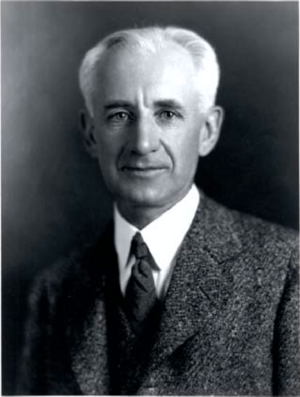Robert Yerkes facts for kids
Quick facts for kids
Robert Yerkes
|
|
|---|---|
 |
|
| Born | May 26, 1876 Breadysville, Bucks County, Pennsylvania, US
|
| Died | February 3, 1956 (aged 79) |
| Known for | intelligence testing |
| Scientific career | |
| Fields | psychology |
Robert Mearns Yerkes (May 26, 1876 – February 3, 1956) was an American psychologist and expert in animal behavior. He is best known for his work on intelligence testing and for studying how animals think and act.
Yerkes was a pioneer in understanding both human and primate (like monkeys and apes) intelligence. He also studied the social behavior of gorillas and chimpanzees. With John D. Dodson, he helped create the Yerkes–Dodson law, which explains how being excited or alert affects how well you perform a task.
Later in his career, Yerkes supported ideas about improving the human race through controlled breeding, which is called eugenics. Today, many of his ideas are seen as unfair and based on outdated and biased views about different groups of people.
He was also a member of important science groups. He was elected to the American Academy of Arts and Sciences in 1915 and the United States National Academy of Sciences in 1923.
Contents
Early Life and Education
Robert Yerkes was born in Breadysville, Pennsylvania, on a farm. He wanted to leave farm life and become a doctor. With help from his uncle, Yerkes went to Ursinus College from 1892 to 1897. After graduating, he got an offer from Harvard University to study biology. He chose Harvard over medical school.
At Harvard, Yerkes became very interested in how animals behave. He decided to study comparative psychology instead of continuing medical training. He earned his Ph.D. in Psychology in 1902.
After finishing school, Yerkes worked as an instructor and assistant professor at Harvard. He also taught at Radcliffe College in the summers to earn more money. He even directed psychological research at a hospital in Boston. In 1907, he published his first book, The Dancing Mouse.
Intelligence Testing and Its Impact
In 1917, Yerkes became the president of the American Psychological Association (APA). During World War I, he helped the APA create programs for the war effort. He led a committee that developed the Army's Alpha and Beta Intelligence Tests. These were the first group tests that didn't require reading or writing. Over 1 million U.S. soldiers took these tests during the war.
Yerkes believed these tests measured a person's natural intelligence, not what they learned in school. However, some questions were about common knowledge, like "Velvet Joe appears in advertisements of ... (tooth powder)(dry goods)(tobacco)(soap)." This showed the tests were influenced by a person's background and education.
Yerkes used the test results to claim that recent immigrants, especially from Southern and Eastern Europe, scored lower than older immigrant groups from Northern Europe. Later, experts criticized these results. They showed that the scores were closely linked to how long someone had lived in the U.S. and how much they had learned about American culture.
Even so, Yerkes's work had a lasting effect. His findings were used to support unfair and biased immigration rules in America. He was even an "Expert Eugenic Agent" for a committee that helped create the National Origins Formula, which limited immigration based on a person's country of origin. Yerkes believed that "no one of us as a citizen can afford to ignore the menace of race deterioration," meaning he worried about what he saw as a decline in the quality of the human population.
Studying Primates
Yerkes had a deep interest in studying chimpanzees. He bought two chimpanzees, Chim and Panzee, from a zoo. He even kept them in a bedroom at his home, where they learned to eat with forks at a tiny table. He wrote about his time with Chim in his book Almost Human (1924).
In 1924, Yerkes became a professor at Yale University. He started the Yale University Laboratories of Primate Biology. Later, he opened the Anthropoid Breeding and Experiment Station in Orange Park, Florida, with money from the Rockefeller Foundation. The primate language called Yerkish was developed at these labs.
Yerkes retired in 1942. After he passed away, his lab moved to Emory University in Atlanta, Georgia. It was then renamed the Yerkes National Primate Research Center.
Legacy and Name Change
In April 2022, Emory University decided to remove Yerkes's name from the National Primate Research Center. This decision came after a review found that Yerkes's past support for eugenics was a problem. The center is now known as the Emory National Primate Research Center.
See also
 In Spanish: Robert Mearns Yerkes para niños
In Spanish: Robert Mearns Yerkes para niños
- Yerkes–Dodson law
- Yerkish
 | Selma Burke |
 | Pauline Powell Burns |
 | Frederick J. Brown |
 | Robert Blackburn |

